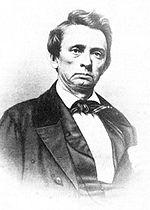Parson Brownlow | |
|---|---|
 | |
| 17th Governor of Tennessee | |
| In office April 5, 1865 – February 25, 1869 | |
| Preceded by | Andrew Johnson as Military Governor |
| Succeeded by | Dewitt Clinton Senter |
| United States Senator from Tennessee | |
| In office March 4, 1869 – March 3, 1875 | |
| Preceded by | David T. Patterson |
| Succeeded by | Andrew Johnson |
| Personal details | |
| Born | William Gannaway Brownlow August 29, 1805 Wythe County, Virginia, U.S. |
| Died | April 29, 1877 (aged 71) Knoxville, Tennessee, U.S. |
| Resting place | Old Gray Cemetery Knoxville, Tennessee |
| Political party | Whig American Republican |
| Spouse | Eliza O'Brien (m. 1836) |
| Relations | Walter P. Brownlow (nephew) |
| Children | Susan, John Bell, James, Mary, Fannie, Annie, Caledonia Temple |
| Profession | Minister, newspaper editor |
| Signature | |
William Gannaway "Parson" Brownlow (August 29, 1805 – April 29, 1877) was an American newspaper publisher, Methodist minister, book author, prisoner of war, lecturer, and politician who served as the 17th governor of Tennessee from 1865 to 1869 and as a United States Senator from Tennessee from 1869 to 1875. Brownlow rose to prominence in the late 1830s and early 1840s as editor of the Whig, a polemical newspaper in East Tennessee that promoted Henry Clay and the Whig Party ideals, and also that repeated Brownlow's opposition to secession by the southern slave states in the years leading up to the American Civil War. Brownlow's uncompromising and radical viewpoints made him one of the most divisive figures in Tennessee political history and one of the most controversial Reconstruction Era politicians of the United States.
Beginning his career as a Methodist circuit rider in the 1820s, Brownlow was both censured and praised by his superiors for his vicious verbal debates responding to rival missionaries of other sectarian Christian beliefs. Later, as a newspaper publisher and editor, he was notorious for his relentless replies in the form of personal attacks against his religious and political opponents, sometimes to the point of being physically assaulted. At the same time, Brownlow was successfully building a large base of fiercely loyal subscribers.[1]
Brownlow returned to Tennessee in 1863 and in 1865 became governor with support of the U.S. Army behind him. Brownlow aligned with the Radical Republicans in the state, supporting President Lincoln's Civil War and Reconstruction era policies and spent much of his term opposing the policies of Conservative Republicans. Brownlow's gubernatorial policies, which were both autocratic and progressive, helped Tennessee become the first former Confederate state to be readmitted to the Union in 1866, "exempting it from the lengthy federal military reconstruction inflicted on most of the South".[1][2] After the Civil War, Brownlow again resumed his opposition to longtime political foe and then president Andrew Johnson, an often bitter and biting dislike for each other that both Brownlow and Johnson had put aside during the dark days on the Civil War.[1]
Soon after the Civil War, Brownlow and Radical Republicans utilized their control of state government to enfranchise male African-American former slaves with the right to vote and run for public office in Tennessee and extend other civil rights to all former slaves. Conservative Republicans generally opposed these actions by Brownlow and his Radical Republican base, and soon after, ex-Confederate political leaders and military officers joined into this opposition directed against Brownlow and utilized the Ku Klux Klan and likeminded vigilante groups in efforts to disenfranchise African-Americans across Tennessee.[1]
- ^ a b c d Forrest Conklin, William Gannaway "Parson" Brownlow. Tennessee Encyclopedia of History and Culture, 2009. Retrieved on October 18, 2012.
- ^ Jack Neely, "Requiem for Parson Brownlow," Metro Pulse, 6 April 2011] Accessed at the Internet Archive, September 20, 2017